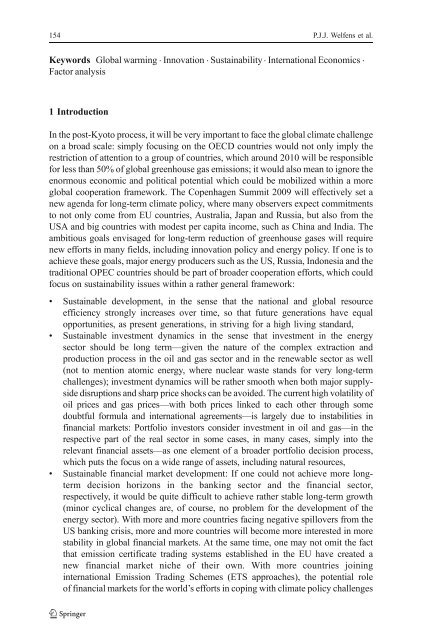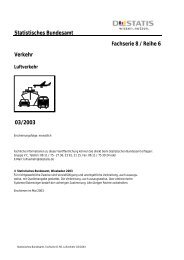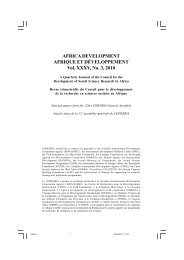The international economics of resources and resource ... - Index of
The international economics of resources and resource ... - Index of
The international economics of resources and resource ... - Index of
Create successful ePaper yourself
Turn your PDF publications into a flip-book with our unique Google optimized e-Paper software.
154 P.J.J. Welfens et al.<br />
Keywords Global warming . Innovation . Sustainability . International Economics .<br />
Factor analysis<br />
1 Introduction<br />
In the post-Kyoto process, it will be very important to face the global climate challenge<br />
on a broad scale: simply focusing on the OECD countries would not only imply the<br />
restriction <strong>of</strong> attention to a group <strong>of</strong> countries, which around 2010 will be responsible<br />
for less than 50% <strong>of</strong> global greenhouse gas emissions; it would also mean to ignore the<br />
enormous economic <strong>and</strong> political potential which could be mobilized within a more<br />
global cooperation framework. <strong>The</strong> Copenhagen Summit 2009 will effectively set a<br />
new agenda for long-term climate policy, where many observers expect commitments<br />
to not only come from EU countries, Australia, Japan <strong>and</strong> Russia, but also from the<br />
USA <strong>and</strong> big countries with modest per capita income, such as China <strong>and</strong> India. <strong>The</strong><br />
ambitious goals envisaged for long-term reduction <strong>of</strong> greenhouse gases will require<br />
new efforts in many fields, including innovation policy <strong>and</strong> energy policy. If one is to<br />
achieve these goals, major energy producers such as the US, Russia, Indonesia <strong>and</strong> the<br />
traditional OPEC countries should be part <strong>of</strong> broader cooperation efforts, which could<br />
focus on sustainability issues within a rather general framework:<br />
& Sustainable development, in the sense that the national <strong>and</strong> global <strong>resource</strong><br />
efficiency strongly increases over time, so that future generations have equal<br />
opportunities, as present generations, in striving for a high living st<strong>and</strong>ard,<br />
& Sustainable investment dynamics in the sense that investment in the energy<br />
sector should be long term—given the nature <strong>of</strong> the complex extraction <strong>and</strong><br />
production process in the oil <strong>and</strong> gas sector <strong>and</strong> in the renewable sector as well<br />
(not to mention atomic energy, where nuclear waste st<strong>and</strong>s for very long-term<br />
challenges); investment dynamics will be rather smooth when both major supplyside<br />
disruptions <strong>and</strong> sharp price shocks can be avoided. <strong>The</strong> current high volatility <strong>of</strong><br />
oil prices <strong>and</strong> gas prices—with both prices linked to each other through some<br />
doubtful formula <strong>and</strong> <strong>international</strong> agreements—is largely due to instabilities in<br />
financial markets: Portfolio investors consider investment in oil <strong>and</strong> gas—in the<br />
respective part <strong>of</strong> the real sector in some cases, in many cases, simply into the<br />
relevant financial assets—as one element <strong>of</strong> a broader portfolio decision process,<br />
which puts the focus on a wide range <strong>of</strong> assets, including natural <strong><strong>resource</strong>s</strong>,<br />
& Sustainable financial market development: If one could not achieve more longterm<br />
decision horizons in the banking sector <strong>and</strong> the financial sector,<br />
respectively, it would be quite difficult to achieve rather stable long-term growth<br />
(minor cyclical changes are, <strong>of</strong> course, no problem for the development <strong>of</strong> the<br />
energy sector). With more <strong>and</strong> more countries facing negative spillovers from the<br />
US banking crisis, more <strong>and</strong> more countries will become more interested in more<br />
stability in global financial markets. At the same time, one may not omit the fact<br />
that emission certificate trading systems established in the EU have created a<br />
new financial market niche <strong>of</strong> their own. With more countries joining<br />
<strong>international</strong> Emission Trading Schemes (ETS approaches), the potential role<br />
<strong>of</strong> financial markets for the world’s efforts in coping with climate policy challenges








